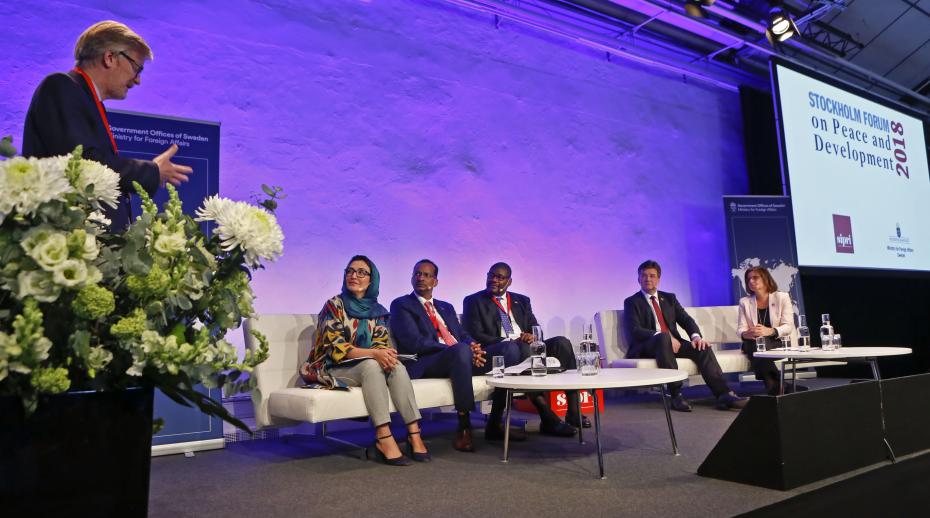
(Stockholm 7 May 2018) Over the next three days, over 350 high-level policymakers, researchers and practitioners will gather in Stockholm on May 7–9 for the fifth annual Stockholm Forum on Peace and Development. Watch the livestream of the opening session here.
This year’s forum centres on the topic ‘the politics of peace’ and was opened by Ambassador Jan Eliasson, former United Nations Deputy Secretary-General and Chair of SIPRI. Inclusivity was a theme highlighted in speeches given in welcoming remarks and the opening address.
HE Margot Wallström, Minister for Foreign Affairs, commented on the importance of inclusivity to peacebuilding noting that ‘women’s participation is essential to creating lasting peace’, citing recent research that ‘peace agreements signed by women have a significantly higher rate of implementation after 10 years’.
Continuing with the notion that inclusivity is a key element for lasting peace, HE Isabella Lövin, Minister for International Development Cooperation and Climate Change, remarked that, ‘An ecosystem of peace based on dialogue and inclusion—a holistic view—is more resilient to attacks than a monoculture that is based solely on the politics of power’.
The keynote address for the forum was delivered by Miroslav Lajčák, President of the United Nations General Assembly. Lajčák said that, ‘it doesn’t matter what we say at high-level meetings if women are still being excluded on the ground’.
The theme for the opening panel was ‘The urgency and logic of investing in violent conflict prevention’ and was moderated by Dan Smith, SIPRI Director. Smith highlighted the complexity of the peacebuilding process, noting that development goes further than economics, ‘even if one thinks about economic development, one is also thinking about reconciliation and the inclusion of different groups’.
HE Gbehzohngar Milton Findley, Minister for Foreign Affairs, Liberia, pointed to the marginalization of young people as a root cause of conflict.
Adela Raz, Deputy Foreign Minister, Afghanistan, highlighted the volatility of modern conflicts. ‘We have seen that violence can transfer in seconds from one country to another, from one continent to another’.
Hassan Hussein Hajji, Minister of Justice, Somalia, noted that ‘priorities are too many, the resources are too few’ but was hopeful that the country would reach their goals.
About SIPRI and the Stockholm Forum
The 2018 Stockholm Forum on Peace and Development enables interdisciplinary exchange among global thought leaders with the aim of influencing key policy and research agendas. It is co-hosted by SIPRI and the Swedish Ministry for Foreign Affairs.
SIPRI is an independent international institute dedicated to research into conflict, armaments, arms control and disarmament. Established in 1966, SIPRI provides data, analysis and recommendations, based on open sources.
The Ministry for Foreign Affairs is responsible for developing and implementing Sweden’s foreign policy. In addition to overseeing the operations of the country’s embassies and consulates, the Ministry for Foreign Affairs is responsible for Sweden’s development cooperation, trade and investment.
For editors
For media or photo requests, please contact SIPRI's Communications Officer Alexandra Manolache alexandra.manolache@sipri.org, +46 76 628 61 33
Photos and videos from the event are available on the SIPRI website. Follow on Twitter with #SthlmForum. Livestreams of plenary session on SIPRI’s Facebook and YouTube channels.